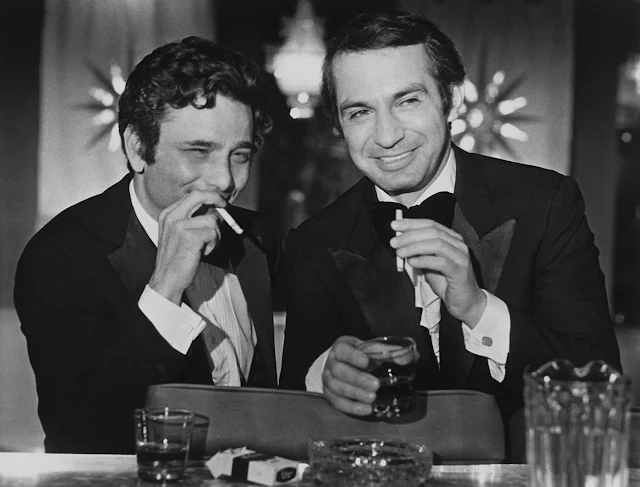Cast: Ben Gazzara, Peter Falk, John Cassavetes, Jenny Runacre, Jenny Lee Wright, Noelle Kao, John Cullers, Meta Shaw Stevens, Leola Harlow, Delores Delmar, Eleanor Zee, Claire Mallis, Peggy Lashbrook. Screenplay: John Cassavetes. Cinematography: Victor J. Kemper. Film editing: John Cassavetes.
There are those who think Husbands is a masterpiece and those who think it’s a self-indulgent mess. While I incline to the latter opinion, I’m willing to hear what those who admire it have to say. Cassavetes is a favorite of those who admire his uncompromising individuality as a filmmaker, and he never displayed it more thoroughly than in Husbands. He compiled months of raw footage shot in New York and London, which he then submitted to an editor, who made what previewers though was a superbly commercial comedy about suburban husbands on a spree. But that wasn’t what Cassavetes wanted, so he took the footage back and edited it into a wholly idiosyncratic film with flashes of comedy but extended scenes of pain. It opens with still photographs, snapshots of some family gathering attended by four buddies: Harry (Ben Gazzara), Archie (Peter Falk), Gus (Cassavetes), and Stuart (David Rowlands). But Stuart appears in the fim only in these photos because he’s dead: The actual movie starts with his funeral, after which Harry, Archie, and Gus express their grief by going on an extended bender, which eventually winds up with the three carousing with any women they can pick up in a London hotel. I can see what Cassavetes is up to with the film: a searching look at the 14-year-old boy in every middle-aged man. And I have to admit that it works. But is it a satisfactory movie? Why do scenes like the beer-sodden song contest in a bar, and the consequent vomiting scene in the bar’s men’s room go on so long? Does Cassavetes not trust the viewer to get the message? Admirers of the film argue that this is exactly the point: the message is in the experience of enduring these and other scenes. We squirm in our seats because Cassavetes wants us to. But is that art or torture?













